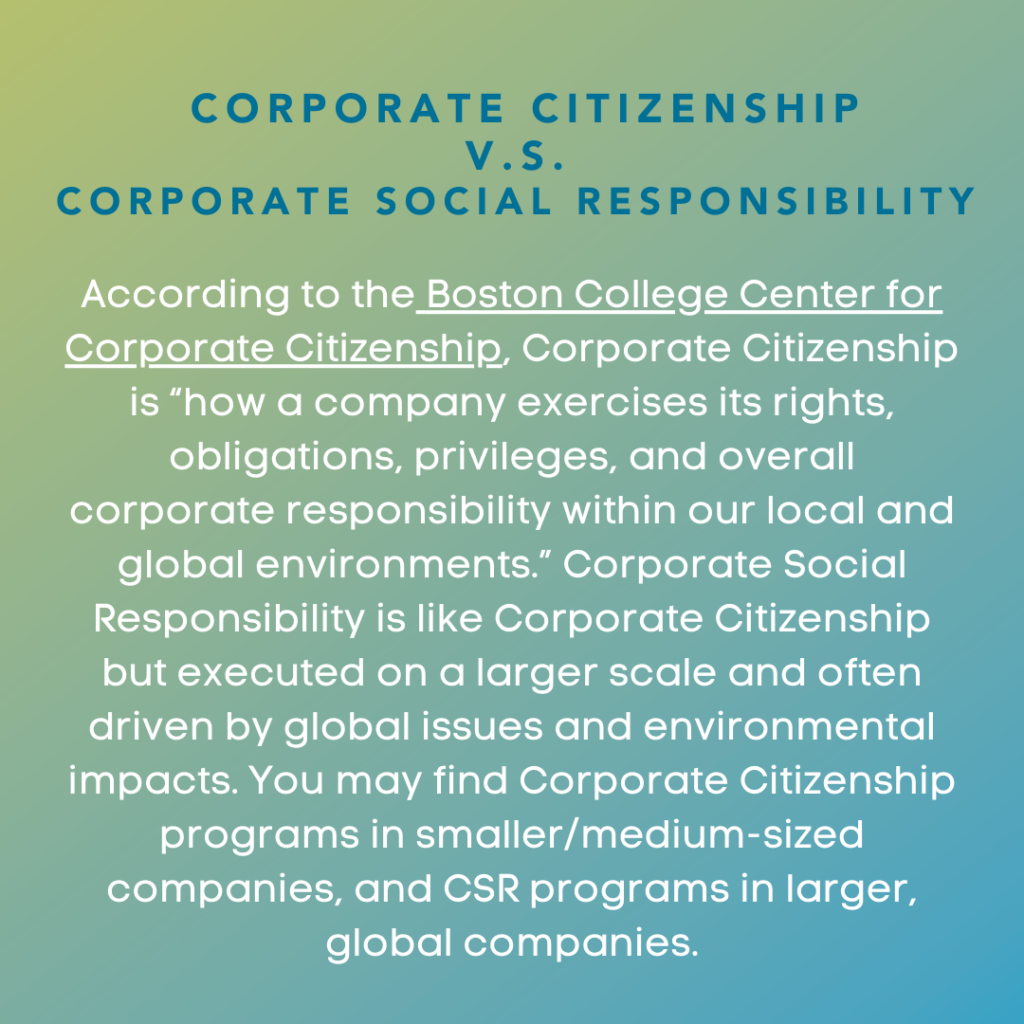Corporate Citizenship: Good for the Community, Stakeholders, and Businesses


In September, we had a chance to sit down with Joni Baird to talk about trends in Corporate Citizenship. Baird is a highly regarded professional on Corporate Citizenship and Social Responsibility. Her expertise in creating high-impact programs has led to awards and recognition that reflect her ability to advance strategic corporate objectives as well as brand, image, and reputation.
These days, in larger corporations, Corporate Citizenship is commonplace. From your experience, what culture shift occurred in corporate America to get us to where we are today within the Corporate Citizenship field?
From my experience in corporate America, I have seen firsthand how companies of all sizes have positioned themselves competitively by adopting strategic Corporate Citizenship initiatives and programs – ones that have strengthened their status as a preferred place to do business and to work.
Things have come a long way, as Dr. Stephen Klineberg, Ph.D., and founding director of Kinder Institute for Urban Research describes in his book Prophetic City, when years ago, a small group of community leaders known as the Suite 8F Crowd met at the Lamar Hotel in Houston and made decisions that impacted the region. This model, with minimal inclusion or input from others, was commonplace in many communities throughout the country.
Today, effective Corporate Citizenship programs are essential because input from stakeholders create more robust corporate citizen programs. Corporate Citizenship should be guided by corporate strategy and values and in consideration of stakeholders, which can include communities, customers, suppliers, government, investors, consumers, and activists.
Contributions of dollars, products, and services, as well as employee volunteerism, are effective ways to engage with communities and be recognized as good corporate citizens. Trusted advisors, like Greater Houston Community Foundation, can assist with developing cost-effective, high-impact programs.
Continue reading: How to Start a Corporate Philanthropy Program
What are the benefits of a strong Corporate Citizenship program?
A strong Corporate Citizenship program can have many benefits. The list is long: attracting and retaining a vital workforce, competitive advantages being the customer and supplier of choice, enhanced brand, image and reputation, operational cost savings, safer workplaces, and navigating emergency and crisis situations.
How do you energize employees about volunteerism?
It all starts at the top with involved leaders. Their active participation signals to employees that volunteering is the right thing to do. It also creates stronger relationships to have shared experiences between a company’s leaders and staff. I found it very rewarding when leaders volunteered, and their experiences sparked a deep feeling in them to make a difference. Once that happened, they were hooked on volunteering and wanted to keep doing it personally and encourage staff to do the same. I think that is true for most of us. It is a driver for successful volunteer programs.
Other tips to consider when creating an employee volunteer opportunity include:
- Create employee-led volunteer committees
- Invite family, retirees, and strategic partners when it makes sense
- Create volunteer projects at the worksite so employees can spend an hour and return to their workstations
Also, it is important to remember to communicate the impact of volunteerism by telling stories and publishing photos of their successes. Remind employees of these shared experiences that may contribute to those employees having greater satisfaction and remaining loyal to your company.
What is some advice you may have about making a Corporate Citizenship strategy scalable across an organization that may have employees working remotely across a given region or even across the nation?
The Corporate Citizenship strategy must align with the overall corporate strategy, adapt to local needs, and ensure engagement by site management. Getting buy-in from local management is essential.
In your experience, have you seen a difference between the level of engagement amongst different generations, say, Millennials vs. Gen Z vs. Baby Boomers.
Data suggests that younger workers such as Millennials and Gen Z have an interest in social issues and a strong desire to engage in making change. However, I believe it is essential to engage various levels of generations, genders, races, and ethnicities, including Black, Hispanic, Asian, and other significantly underrepresented individuals, to create a meaningful impact.
One of the most moving interactions I had in corporate America was during a conversation with the Food Bank and a group of Baby Boomers. One of my colleagues got tears in her eyes when she talked about children going to school hungry. She later said that was her experience as a child, and she did not want that happening to other children. Our company eventually became involved in the Houston Food Bank’s Backpack Buddy food program, one of our most successful employee volunteer initiatives.
How should a company balance Corporate Citizenship strategy and addressing crises like natural disasters and the pandemic?
Every company with a Corporate Citizenship strategy should prepare and plan to allocate dollars for a crisis so that the dollars are in place when they need them the most. Each company should develop criteria for funding ahead of time, differentiating what will be funded in the short term (the response phase) and the long term (the recovery phase). Greater Houston Community Foundation is a great partner for this with their Employee Disaster Relief Funds and other corporate giving vehicles.

More Helpful Articles by Greater Houston Community Foundation:
- The Importance of Charitable Giving in Financial and Estate Planning
- Philanthropy Made Easy: 3 Do’s and Don’ts for Your Donor Advised Fund
- Celebrating the Ultimate Boy Mom
- Advancing Impact Donor Breakfast: Building Thriving Neighborhoods
This website is a public resource of general information that is intended, but not promised or guaranteed, to be correct, complete and up to date. The materials on this website, including all comments and responses to comments, do not constitute legal, tax, or other professional advice, and is not intended to create, and receipt or viewing does not constitute, nor should it be considered an invitation for, an attorney-client relationship. The reader should not rely on information provided herein and should always seek the advice of competent legal counsel and/or a tax professional in the reader’s state or jurisdiction. The owner of this website does not intend links on the website to be referrals or endorsements of the linked entities.